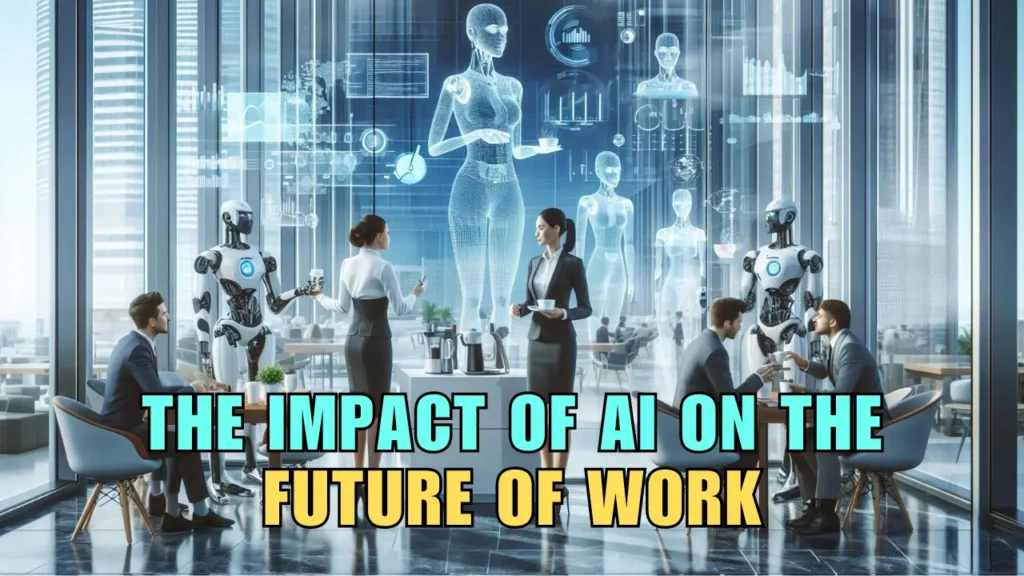Artificial intelligence (AI) is rapidly transforming the world as we know it, and its impact on the future of work is a topic of great interest and debate. In this article, we will explore the potential impact of AI on the workforce, examining both the opportunities and challenges it presents.

Table of Contents
AI’s Potential to Enhance Human Capabilities
AI has the potential to augment human capabilities and make us more productive and efficient in our work. For example, AI-powered tools can:
- Automate repetitive and time-consuming tasks, freeing up human workers to focus on more strategic and creative endeavors.
- Provide real-time insights and recommendations, enabling workers to make better decisions and solve problems more effectively.
- Enhance collaboration and communication, breaking down barriers between teams and individuals.
AI’s Potential to Create New Jobs and Industries
AI is not only automating existing jobs but also creating new ones. The development, deployment, and maintenance of AI systems require specialized skills, leading to the emergence of new job roles such as:
- AI engineers and researchers
- Data scientists and analysts
- Machine learning specialists
- AI ethicists and policymakers
Furthermore, AI’s ability to automate tasks and processes can create new industries and business models, such as:
- AI-powered customer service chatbots
- AI-driven predictive analytics and forecasting
- AI-enabled personalized learning platforms
AI’s Potential to Displace Jobs
While AI has the potential to create new jobs, it also poses the risk of job displacement. AI systems can perform certain tasks more efficiently and accurately than humans, leading to concerns about job losses in sectors such as:
- Manufacturing and production
- Transportation and logistics
- Data entry and processing
- Customer service and support
Preparing for the Future of Work with AI
To mitigate the potential negative impact of AI on the workforce, it is crucial to take proactive steps to prepare for the future of work. This includes:
- Investing in education and training programs to equip workers with the skills needed to work alongside AI.
- Creating policies and regulations to ensure ethical and responsible development and use of AI.
- Promoting lifelong learning and continuous skill development to enable workers to adapt to changing job requirements.
More Content like this – The impact of AI on the future of work
What is a website hosting service? and hosting provider
How to use AI to write better blog posts
The best AI tools for marketing automation
Embracing the Opportunities and Addressing the Challenges
The impact of AI on the future of work is a complex and multifaceted issue. While AI has the potential to revolutionize the workplace, creating new opportunities and enhancing human capabilities, it also presents challenges that need to be addressed. By embracing the opportunities and proactively addressing the challenges, we can shape the future of work to benefit both individuals and society as a whole.
AI is poised to have a profound impact on the future of work. By understanding its potential to enhance human capabilities, create new jobs, and displace others, we can prepare for the changes that lie ahead. Through education, training, policymaking, and continuous learning, we can harness the power of AI to create a future of work that is both prosperous and inclusive.
Summary of the Impact of AI on the Future of Work Article
Artificial intelligence (AI) is rapidly transforming the workplace, presenting both opportunities and challenges for the future of work. The impact of AI on the future of work
Potential Benefits of AI:
- Enhanced human capabilities through automation, insights, and collaboration.
- Creation of new jobs in AI development, data science, and ethics.
- Emergence of new industries and business models powered by AI.
Potential Challenges of AI:
- Job displacement in sectors where AI can perform tasks more efficiently than humans.
Preparing for the Future of Work with AI:
- Invest in education and training to equip workers with AI-related skills.
- Develop policies and regulations for ethical AI development and use.
- Promote lifelong learning and continuous skill development.
Conclusion:
By embracing the opportunities and addressing the challenges presented by AI, we can shape the future of work to benefit both individuals and society. AI has the potential to revolutionize the workplace, creating new possibilities while also requiring proactive measures to mitigate potential job losses.
